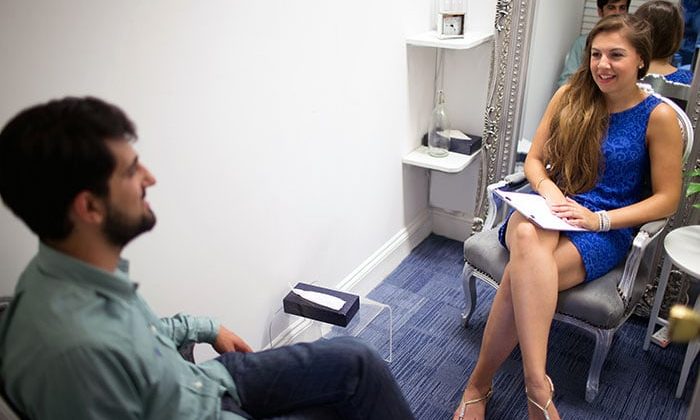Tara McCloskey is a Cognitive Behavioural Therapist (CBT) in London, working both in private practice for the Private Therapy Clinic and for the NHS. She provides therapy both in English and in Farsi and was born and lives in London. Today I interviewed Tara to find out more about her role as a CBT therapist, her lifestyle and what her job involves.
Tara as a CBT therapist
As a Cognitive Behavioural Therapist (CBT), my role is to provide treatment for a range of disorders such as anxiety and depression .I have recently specialised in treating eating disorders. Working with eating disorders is one of my favourite areas because it is so challenging with many aspects to it keeping me engaged. A number of eating disorder clients also present with personality disorders which can also be a challenge but something I like to treat. Working with eating disorders is fascinating because there are many different issues within one diagnosis which need to be addressed so it keeps me on my toes. As a CBT Therapist, I enjoy the balance between all the different treatments I offer, especially in private therapy where I have a large variety of patients.
I work with a wide range of different difficulties in private practice however the people I see are very similar to NHS patients who I also treat. As humans, we all suffer from similar problems, regardless of our background and socio-economic status, meaning mental health issues can affect us all.
I work Monday to Friday and enjoy taking the weekends as my free time. Mondays, Wednesdays and Fridays, I work as a CBT therapist across various parts of London, including Harley Street, High Street Kensington for The Private Therapy Clinic, and I also practice in the NHS. On Thursdays I work on management duties for The Private Therapy Clinic to ensure everything runs smoothly at all of our London branches.
Within my working day, I can see the whole spectrum of difficulties my patients face. For example, within anxiety disorders, I see different types such as social anxiety, post-traumatic stress disorder, and relationship anxiety. I also work with adolescents in my work at The Private Therapy Clinic, meaning my client age range is 14+. I adapt the CBT protocol to enable me to treat adolescents. It’s very similar to the CBT I do with adults but the adaptations allow this type of therapy to work really well with teenagers. It is a privilege to work with younger clients as it fits in with what inspired me to become a CBT therapist in the first place.
Tara beyond being a CBT therapist
Tuesday is my wellbeing day, which is when I look after myself, by going to the gym or trying yoga and pilates classes. I love to make the most of my free time as I feel it is important to keep a healthy work life balance and do as much as I can.
Apart from my weekly wellbeing day, I am particularly passionate about doing yoga retreats where I have holidays from work. I also try and travel abroad as much as I can. I socialise and see my family a lot, however when I get home I like to unwind by watching easy viewing TV. I find the best way for me to switch off is to either watch a good TV series or read a book which is light hearted or relevant to therapy. I have a great team behind me at The Private Therapy Clinic. This means I am well supported and this has a knock on effect in terms of not taking work home, helping me to switch off easily.
Lessons learnt from CBT
What I have learnt from being a CBT therapist in London is the clients need to be motivated in order to make progress with therapy. The sessions are only 50 minutes and for therapy to be effective for the client, it requires them to keep practicing what they have learned outside of the sessions and to do the homework agreed with the therapist. Progress without motivation to change is limited and if someone is expecting their difficulties to go away quickly or they set expectations which are too high, they can be quite disappointed with the outcome. This often reflects how they are interacting in their own lives and the rules and beliefs for living that they hold.
Sometimes clients might drop out because they are not ready for the challenges therapy brings about, even when they think they are ready. CBT does not always suit everyone, some people might just want to come in and talk which is not what we do in the sessions. If they want to do it, that is fine but they will not see a significant change in their lives. It is like when you are learning to drive, it is not enough to have a pass on your theory test – you also need to practice driving before you can get a driver’s licence.
Lessons learnt from practicing therapy in London
Luckily, while working at Private Therapy Clinic as a CBT therapist, I see clients that are in London to work but are from all over the world – that’s a privilege as well. A lot of people present with difficulties arising from pressures at work, especially in banking and demanding companies. I also see people who have difficulties acclimating to the London lifestyle, not having a strong support network, even people not having used a tube before who are now experiencing panic attacks – while trying to travel underground, you would not believe how common that is!
Also in the capital, there is a growing pressure on appearances and you can see how this can create difficulties if you perceive yourself to not be achieving this expected “London look”. As for me, I do not feel it as much because I was born here and I do not know any other way of living, but even I sometimes struggle to keep up or slow down. I like to remind myself to be more mindful on a regular basis and it is nice that I have a job where I have gained experience practicing the skill of how to be in the present moment. Like many other people, I am guilty of rushing to the next thing, thus having an impact on anxiety and self-esteem. Fortunately, the impact of rushing can be minimised with techniques from CBT which I like to practice myself as well as with my clients.
What it’s like to be a Therapist
A lot of people ask me if my job involves “just sitting there and listening to people”. It really is not just about that, but involves constant training and keeping up to date with research and evidence, planning sessions and tailoring homework for each individual patient. I try to adjust the treatment so that it is relevant to every person I see. However, the stigma still exists and some people ask me whether I am working with “mad people”. I explain what I do as the people I see are everyday people, that are in amazing jobs, living amazing lives and nobody knows what they are thinking and feeling on the inside. The blanket generalization that anybody that comes and sees a therapist is a mad person is really not relevant. All of us can stand to learn more about ourselves and the changes we can make to improve our lives. Luckily, CBT can be used for that. I would encourage anyone that wants to live their best life to try a bit of CBT.
How can I speak to Tara?
If you’d like to talk to Tara or another CBT therapist, speak to one of our therapists here at Private Therapy Clinic.

















